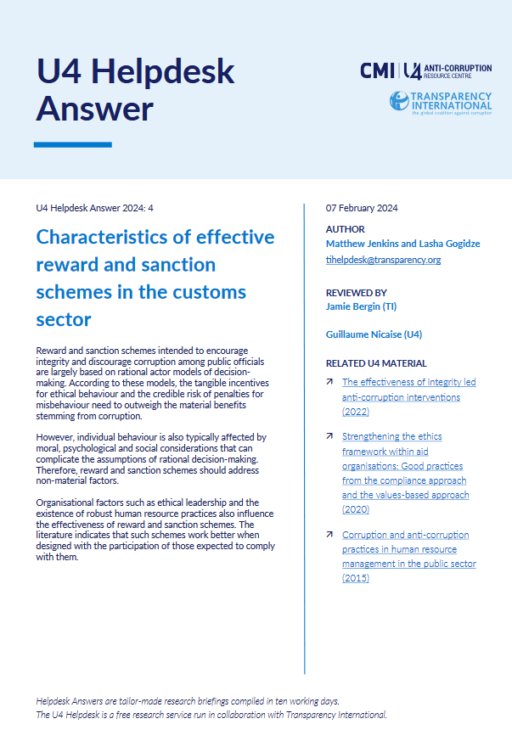- Home
- Anti-Corruption Helpdesk
- Characteristics of effective reward and sanction schemes in the customs sector
Characteristics of effective reward and sanction schemes in the customs sector

This Anti-Corruption Helpdesk brief was produced in response to a query from a U4 Partner Agency. The U4 Helpdesk is operated by Transparency International in collaboration with the U4 Anti-Corruption Resource Centre based at the Chr. Michelsen Institute.
Query
Please assess the effectiveness of reward and sanction schemes in the public sector, with a focus on customs agencies
Summary
Reward and sanction schemes intended to encourage integrity and discourage corruption among public officials are largely based on rational actor models of decision-making. According to these models, the tangible incentives for ethical behaviour and the credible risk of penalties for misbehaviour need to outweigh the material benefits stemming from corruption.
However, individual behaviour is also typically affected by moral, psychological and social considerations that can complicate the assumptions of rational decision-making. Therefore, reward and sanction schemes should also address non-material factors.
Organisational factors such as ethical leadership and the existence of robust human resource practices also influence the effectiveness of reward and sanction schemes. The literature indicates that such schemes work better when designed with the participation of those expected to comply with them.
Main points
- When used proportionally and in a consistent and complementary manner, reward and sanction schemes can effectively deter corruption in public administration.
- In some corruption prone sectors, such as customs, financial incentives can act as a key determinant of the behaviour of customs officers and their clients alike. Therefore, financial rewards for ethical behaviour as well as administrative penalties, such as fines for misbehaviour, can act as a counterweight to the potential illicit gains stemming from corrupt deals.
- Yet financial rewards and penalties alone are often insufficient to outweigh the lure of dirty money. Fortunately, moral, psychological and social factors are also important drivers of behaviour.
- As such, the effectiveness of reward and sanction schemes may be heightened where they are aligned with individuals’ non-financial motives, such as professional pride and recognition through integrity awards, or ‘deterrence nudges’, such as warnings about the probability of detection and sanction.
- For reward and sanction schemes to ensure convergence between employees’ personal integrity standards and expectations, and those of the organisation, they should thus be integrated into a broader internal affairs and human resources management system, characterised by high degrees of transparency, accountability and impartiality.
- Moreover, robust procedures should be established to apply rewards and sanctions in an impartial manner, with care taken to avoid the perception of unfairness and the emergence of perverse incentives.
Contents
- Introduction
- Reward and sanction schemes
- Reward and sanction schemes in practice
- Integrity awards
- Reporting incentives
- Disciplinary regimes
- Conclusion
- References
Caveat
There is increasing attention being paid to the application of rewards and sanctions schemes – as well as behavioural “nudges” – to improve the legal and regulatory compliance of customs clients on the supply side (Yong 2023). However, this Helpdesk Answer considers only rewards and sanctions schemes designed to improve the integrity of customs officials; in other words, demand-side interventions that customs institutions can undertake.
Moreover, although the final part of this Helpdesk Answer considers specific rewards and sanctions in isolation, in practice, reward and sanction schemes are typically combined into a broader organisational integrity management system, ideally overseen by internal affairs units and human resource management (Ferreira et al. 2007).
This complicates efforts to determine the effectiveness of individual schemes, which typically exist as part of a broader, complex web of incentives provided by a range of reward, sanctions, organisational characteristics and individual factors.
Authors
Matthew Jenkins and Lasha Gogidz, [email protected]
Reviewers
Jamie Bergin (TI) Guillaume Nicaise (U4)
Date
21/02/2024
Tags
 Download PDF
Download PDF
